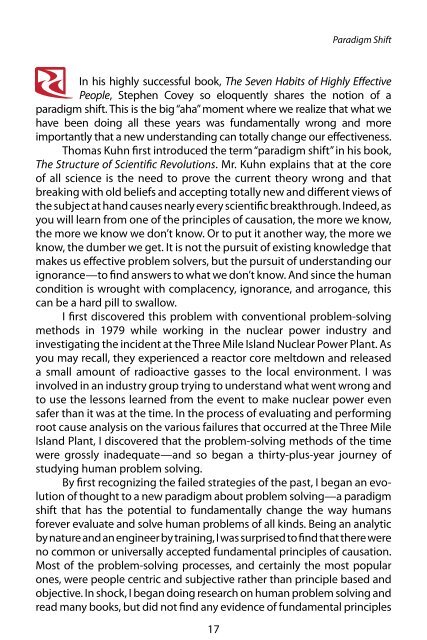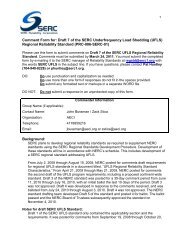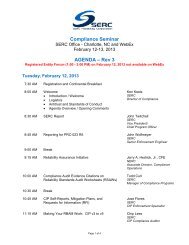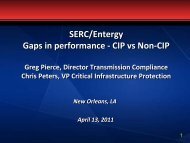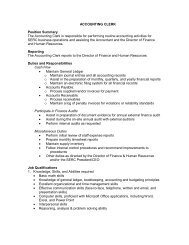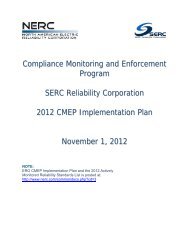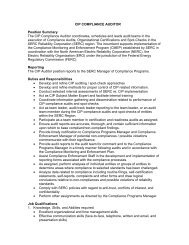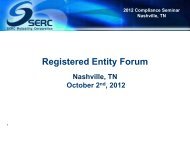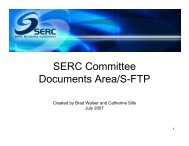RealityCharting e-book .pdf - SERC Home Page
RealityCharting e-book .pdf - SERC Home Page
RealityCharting e-book .pdf - SERC Home Page
- No tags were found...
Create successful ePaper yourself
Turn your PDF publications into a flip-book with our unique Google optimized e-Paper software.
Paradigm Shift<br />
In his highly successful <strong>book</strong>, The Seven Habits of Highly Effec tive<br />
People, Stephen Covey so eloquently shares the notion of a<br />
paradigm shift. This is the big “aha” moment where we realize that what we<br />
have been doing all these years was fundamentally wrong and more<br />
importantly that a new understanding can totally change our effectiveness.<br />
Thomas Kuhn first introduced the term “paradigm shift” in his <strong>book</strong>,<br />
The Structure of Scientific Revolutions. Mr. Kuhn explains that at the core<br />
of all science is the need to prove the current theory wrong and that<br />
breaking with old beliefs and accepting totally new and different views of<br />
the subject at hand causes nearly every scientific breakthrough. Indeed, as<br />
you will learn from one of the principles of causation, the more we know,<br />
the more we know we don’t know. Or to put it another way, the more we<br />
know, the dumber we get. It is not the pursuit of existing knowledge that<br />
makes us effective problem solvers, but the pursuit of understanding our<br />
ignorance—to find answers to what we don’t know. And since the human<br />
condition is wrought with complacency, ignorance, and arrogance, this<br />
can be a hard pill to swallow.<br />
I first discovered this problem with conventional problem-solving<br />
methods in 1979 while working in the nuclear power industry and<br />
investigating the incident at the Three Mile Island Nuclear Power Plant. As<br />
you may recall, they experienced a reactor core meltdown and released<br />
a small amount of radioactive gasses to the local environment. I was<br />
involved in an industry group trying to understand what went wrong and<br />
to use the lessons learned from the event to make nuclear power even<br />
safer than it was at the time. In the process of evaluating and performing<br />
root cause analysis on the various failures that occurred at the Three Mile<br />
Island Plant, I discovered that the problem-solving methods of the time<br />
were grossly inadequate—and so began a thirty-plus-year journey of<br />
studying human problem solving.<br />
By first recognizing the failed strategies of the past, I began an evolution<br />
of thought to a new paradigm about problem solving—a paradigm<br />
shift that has the potential to fundamentally change the way humans<br />
forever evaluate and solve human problems of all kinds. Being an analytic<br />
by nature and an engineer by training, I was surprised to find that there were<br />
no common or universally accepted fundamental principles of causation.<br />
Most of the problem-solving processes, and certainly the most popular<br />
ones, were people centric and subjective rather than principle based and<br />
objective. In shock, I began doing research on human problem solving and<br />
read many <strong>book</strong>s, but did not find any evidence of fundamental principles<br />
17


